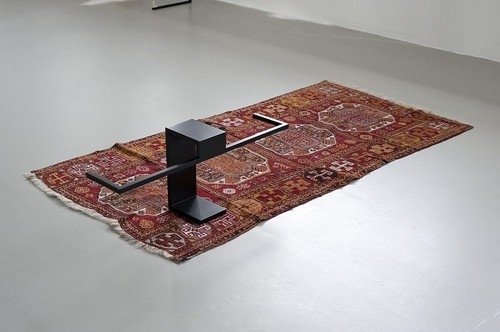Thea Djordjadze
dal 20/3/2009 al 23/5/2009
Segnalato da
20/3/2009
Thea Djordjadze
Kunsthalle Basel, Basel
Endless enclosure. The artist mainly works with sculpture although she has also realized performances and been involved in music projects. In her sculptures, she often uses perishable, fragile, everyday materials that are derived from the vocabulary of domesticity and may hint at femininity, such as plaster, ceramic, silicon, sponge, cardboard, textiles and soap. The shelves, railings, walls and boxes that support or encase the sculptural objects, are simple but delicate architectural structures of wood and metal.

Kunsthalle Basel presents the first solo exhibition in Switzerland by the Georgian artist Thea Djordjadze (1971, Tbilisi).
The show’s title – endless enclosure – conveys a powerful image of an open horizon but its paradoxical formulation also brings to mind Alain de Lille’s famous 12th century description of the mystical geometry of the absolute as a “cosmic sphere, whose centre is everywhere and circumference nowhere”. These thoughts can be later found reiterated in the writings of Giordano Bruno, Pascal, Nietzsche and other Western philosophers, but also in Zen Buddhism. The position of the viewer in the exhibition is inscribed within a set of variable spatial parameters, as the distances between the objects and their relative scale change with the movement of the perceiving subject, while the endless enclosure of the surrounding “world” remains constant.
Thea Djordjadze mainly works with sculpture although she has also realized performances and been involved in music projects. In her sculptures, she often uses perishable, fragile, everyday materials that are derived from the vocabulary of domesticity and may hint at femininity, such as plaster, ceramic, silicon, sponge, cardboard, textiles and soap. The shelves, railings, walls and boxes that support or encase the sculptural objects, are simple but delicate architectural structures of wood and metal. Their expression stands in stark contrast to the organic shapes and “unfinished” surfaces of modestly scaled sculptures propped against walls, resting on shelves or hanging from railings. These passive-aggressive configurations of conflicting but mutually dependent objects make cryptic and elliptical reference to the sculpture of classical modernism. The artist’s drawings and watercolours are often part of installations, doubling and heightening their expressive impact and also underlining the fragmentary, unfinished state of the work. They are neither preliminary sketches for future three-dimensional works nor are they studies of already existing sculptures or autonomous pieces. It is as if the sculptures were living bodies that have assumed a definitive shape and became motionless only for a moment – and the drawings have taken note of their temporary appearance.
The transitory character of these sculptural works is reinforced by including specific existing cultural artefacts in the installation at Kunsthalle Basel. From the collection of Richard Hersberger in Muttenz, Thea Djordjadze selected carpets manufactured by nomads in different regions of the world. In nomadic cultures, the richly decorated carpets have meaning as status symbols as well as being an abstract record of the personal and social history of their makers and their families. They also serve a practical purpose, replacing the furniture used in sedentary culture. Carpets designate a home in time: a moving place in the endless enclosure.
The exhibition has been generously supported by Martin Hatebur.
Additional support has been provided by Sprüth Magers Gallery, Berlin/London.
Thea Djordjadze was represented in the Lyon Biennial (with Rosemarie Trockel, 2007) and the Berlin Biennial (at Neue Nationalgalerie and Skulpturenpark Berlin-Zentrum, 2008). She had important solo exhibitions at Studio Voltaire in London (Possibility, Nansen, 2006) and Kunstverein Nuremberg (2008, with comprehensive catalogue). She was a member of the artists’ collective hobbypopMUSEUM (1999-2003) and has curated exhibitions (most recently Salome Machaidze, Emma Nilsson, Michail Pirgelis at Micky Schubert Gallery, Berlin, 2008).
Opening march 21, 2009 h 7pm
Kunsthalle Basel
Steinenberg 7 - Basel
Opening hours: Tue/Wed/Fri 11am–6pm · Thu 11am–8.30pm · Sat/Sun 11am–5pm
Admission: CHF 10.-/6.- incl. S AM Swiss Architecture Museum



